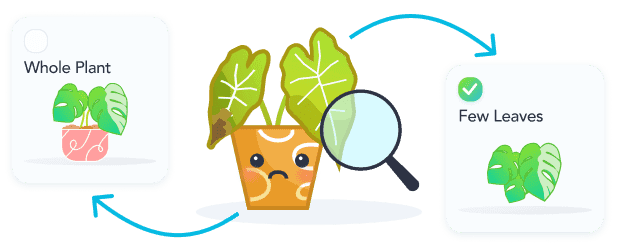Every 10d
Recommended Frequency
1 /2 cup of water
Recommended Amount
The Fiddle Leaf Fig loves a vast amount of water with dry spells in between. Water your Fiddle Leaf Fig when the soil is fifty to seventy five percent dry, making sure to keep the bottom saucer dry so that the roots do n...
Every 30d
Recommended Frequency
Fertilize your Fiddle Leaf Fig once a month during spring, summer, and autumn using a liquid fertilizer high in nitrogen. Fertilize once, mid winter.
Indirect Sun
Recommended
Indirect Sun or Filtered Sun is when sun exposure is being filtered through a sheer curtain or is not able to have the sun's rays directly hit the leaves/flowers of your plant.
Every 730d
Recommended Frequency
Repot your Fiddle Leaf Fig every two years, or once it outgrows its pot.
For a fiddle leaf fig, the ideal temperature range is between 60 to 75 degrees Fahrenheit. This range ensures the plant thrives, indicating it prefers a moderate to high temperature setting. Summary: Fiddle leaf figs t...
Peat Soil
Recommended Soil
Peat Soil is an acidic soil that retains a lot of moisture and slows decomposition. Due to such a high moisture retention this mix may require irrigation to help with draining. This soil type is best used when paired wit...
Fiddle leaf figs thrive in environments with a humidity level ranging from 30% to 65%, ideally sitting around the 40% to 60% mark. This range supports their growth and health, mimicking their natural habitat. To ensure y...

Shop Fiddle Leaf Fig
Questions about Fiddle Leaf Fig
A Fiddle Leaf Fig plant, scientifically known as Ficus lyrata, is a popular indoor plant known for its large, glossy, violin-shaped leaves. Native to the tropical rainforests of West Africa, it thrives in bright, indirec...

Toxicity of Fiddle Leaf Fig

Common Pests and Diseases
Root Rot
Overwatering
To address root rot, first, allow the soil to dry out completely before watering again. If the plant is severely affected, remove it from its pot, trim away any black, mushy roots, then repot in fresh, well-draining soil. Ensure the pot has adequate drainage holes. Moving forward, water only when the top inch of soil is dry to the touch, and ensure the plant is in a well-ventilated area to prevent moisture buildup.
Leaf Dropping
Underwatering
To address leaf dropping due to underwatering, it's crucial to establish a consistent watering schedule. Fiddle leaf figs prefer a moderate amount of moisture; allow the top inch of soil to dry out before watering again. Ensure the pot has adequate drainage to prevent root rot. If the plant is severely dehydrated, immerse the pot in a water bath for about 10 minutes, then let it drain thoroughly. Adjust your watering frequency based on the season, with less frequent watering in winter.
Spider Mite Infestation
Spider mites are tiny pests that thrive in warm, dry conditions. They feed on the sap of the fiddle leaf fig, causing yellowing and dropping of leaves.
To combat spider mites, first isolate the affected plant to prevent spread. Increase humidity around your fiddle leaf fig, as spider mites prefer dry conditions. Wash the leaves with a gentle stream of water to physically remove the mites. For severe infestations, apply neem oil or a miticide specifically designed for spider mites, following the product's instructions carefully. Regularly inspect your plant for signs of return and maintain a routine of wiping the leaves to deter future infestations.
Leaf Drop
Environmental Stress
Fiddle leaf figs are sensitive to changes in their environment, such as moving to a new location, temperature fluctuations, or drafts. To mitigate leaf drop, try to maintain a stable environment. Keep the plant in a well-lit area away from direct drafts and sudden temperature changes. Gradually acclimate your plant to new locations by slowly introducing it to new spots over the course of several days. Consistency in care is key to preventing stress-induced leaf drop.

Related Plants
Other Articles:
Top 10 Most Popular Roses
Mar 22, 2022
How to Care for China Roses
Mar 11, 2022
How to Care for Chinese Money Plants
May 15, 2020
How to Grow and Care for A Bird of Paradise
Apr 26, 2020
Top 10 Plants To Grow In A Terrarium
May 31, 2022
How to Grow and Care for Lucky Bamboo
Mar 29, 2022
How to Grow and Care for Corn Plants
Mar 29, 2022
How to Care for Madagascar Dragon Trees
Mar 21, 2022



